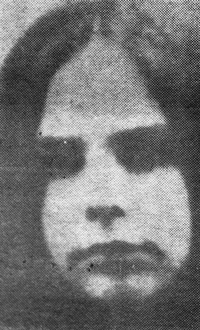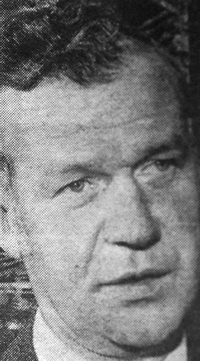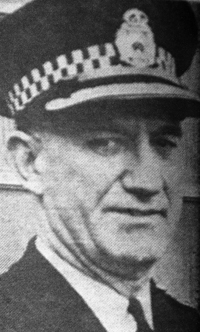IN the late summer of 1971 a young German girl arrived on Loch Lomondside on a hiking holiday — and disappeared. What followed turned out to be one of the most fascinating yarns from the early days of my career in journalism. This is what I wrote for the Helensburgh Advertiser of September 17 that year . . .
THE RAIN lashed down in buckets. The midges were out in force. The road curved on for seemingly endless mile after mile. It was cold, wet and miserable — and the mystery of Frauke Kissenkotter was about to begin.
In just a few hours time, 15 year-old long-haired, well developed and attractive Frauke was to disappear.
People throughout Britain would gradually become more involved. A class of teenage girls in a German town near Munich would watch bewildered as a photographer took pictures of an empty desk. A Glasgow garage boss would almost forget about cars.
As the bedraggled, tired hitchhiker trudged dolefully through the storm heading back to Loch Lomondside, a police superintendent sat by his fireside and watched his own daughter prepare for a hostelling holiday.
Nobody knew, nobody could even guess that a story which so nearly was a tragedy and which will certainly become part of the lore of Loch Lomondside was about to begin.
Cheery Start
The world now knows that that the ten day search for the German schoolgirl ended happily at a London Post Office.
But what really happened during the 250 hours from the moment Frauke wiped the streaming rain from her eyes on the road to Loch Lomond to the time when she stepped into the arms of waiting London police officers — and a chorus of “She’s been found safe” winged its way around the country?
It was in August when the last fond farewells were said and Frau Kissenkotter closed the door of her home at Eichenbuhl, im Scheibling, 19, Bavaria, West Germany, as her 17 year-old son Tillman Jakob and daughter Frauke set off cheerfully at the start of their hitch-hiking holiday to Britain. It was a start full of excitement and promise of adventure to come.
Safely they made their way to Britain. Safely they spent some time in London, cavorting with other young people in the green vastness of Hyde Park.
Safely they hitched to Newcastle and across country to the Lake District. Safely they headed north, their destination the famous, impressive and almost frightening hillscape of Skye.
It was bright, it was fun, it was friendly, and there were lots of young people in the Loch Lomond Youth Hostel at Auchendennan on the night of Friday August 27. Most of the hostellers would reach their destination. The polite but shy German couple would not.
Saturday morning, bright and early, they were on their way, competing with other hikers for the few lifts offered by the publicity-hardened motoring tourists on the lochside. Beautiful the loch may have been, but it was hard going on the feet.
It was not much of a day either, and by 2pm Tillman knew that Frauke was tired, tense and touchy, and ready for another of the occasional rows they had had on their journey north. Then, at Ardlui, their hopes were raised and their outlook brightened. An orange-coloured mini acknowledged their upraised thumbs and drew to a halt ahead of them.
They raced eagerly to the opened passenger door, and their faces fell. For the little car was filled by a balding, middle-aged man, a child asleep in the back, and a lot of luggage. Tillman decided — against all he had been told — to let his weary sister go on alone. Even then they had to move luggage to make room for her.
‘Wait for me’
“We will meet in Crianlarich. Wait for me. I will catch up with you. Take care,” he said as they parted in the lochside hamlet.
It was very wet now as Tillman trudged on towards Crianlarich. Glad he was when a car pulled in and two young women beckoned him over and cleared away sleeping bags and rucksacks from the back of their Morris Minor to allow him in.
Little did he know that one of the young women was the daughter of a man he would become closely involved with, Superintendent Alasdhair MacKellar of Dunbartonshire Constabulary.
A little later he was on his own again, looking around the youth hostel at Crianlarich for a sign of his sister. Perturbed but not really alarmed, he left a message for her that he would go on to the hostel at Fort William for the night and then to Inverness as they had planned. When she arrived she was to contact him.
All this time Frauke was not so very far away. Because of her poor English and the strangeness of the countryside she had been driven through Crianlarich and on to the next village of Tyndrum. There the man in the mini left her to find her brother, but she soon discovered she had gone too far.
A Bearsden couple out for a Sunday run drove past her as she walked the long miles back from Tyndrum to Crianlarich. When they drove back some two hours later the couple, Mr and Mrs D.R.Deuchars, took pity when they saw the girl again still plodding through the rain. They took her back to Crianlarich, and Mr Deuchars helped her look for Tillman.
But by a freak of misfortune he had passed his sister as he travelled north and she walked south. And when they could not find him, Frauke begged the Deuchars to take her back to Ardlui. By 7.30pm they were on their way home, and Frauke stood alone and lonely. The rain poured down, and she spent two hours just sheltering in the Ardlui telephone kiosk.
The mystery of Frauke Kissenkotter was about to begin.
The search
Police teleprinters hummed from Inverness-shire to Dunbartonshire on Monday August 30. For the anxious Tillman reported to Inverness police that his sister was lost.
 MISSING PERSON said the police messages, and they went on to describe Frauke as having poor English, 5ft 6ins tall, long medium-brown hair, blue eyes, fair complexion, wearing purple trousers, striped jersey in several colours, cotton blouse, dark blue anorak, brown suede hiking shoes, carrying a black leather handbag, a blue rucksack, and a light blue sleeping bag. Her passport photo was circulated.
MISSING PERSON said the police messages, and they went on to describe Frauke as having poor English, 5ft 6ins tall, long medium-brown hair, blue eyes, fair complexion, wearing purple trousers, striped jersey in several colours, cotton blouse, dark blue anorak, brown suede hiking shoes, carrying a black leather handbag, a blue rucksack, and a light blue sleeping bag. Her passport photo was circulated.
In the absence of Chief Inspector Leslie Mills, Superintendent Alasdhair MacKellar, deputy commander of the western division of Dunbartonshire police, was the man in charge at Helensburgh police station in Sinclair Street when the teleprinter light went on and the machine in the corner stuttered out its message.
All that was known at that time was that Frauke had climbed into an orange mini at Ardlui. To this day the owner of that mini has not been traced.
The office in Sinclair Street became the headquarters of the ten day search, one of the biggest ever mounted for a missing person in Britain and one of the most unusual. This was how it progressed:
MONDAY AUGUST 30: Police look out for orange mini. Search concentrates between Crianlarich and the north.
TUESDAY AUGUST 31: Still no trace of the missing girl. It was suggested she could be in Inverness-shire as the pair had intended travelling to Skye. The BBC broadcast a description.
WEDNESDAY SEPTEMBER 1: One of the key days in the search. The Bearsden couple came forward to tell of taking Frauke back to Ardlui. Police checked hostels, camping sites, boarding houses, and caravan parks at Ardlui, Luss, Inverbeg and Ardgarten. Details were flashed to the English police and the port authorities at Dover.
Members of the public reported sightings of Frauke on Sunday at places as far apart as Cairndow, Glencroe, Kilmun, Partick Cross, Aberdeen and Berwick. Full details were issued to the press, and BBC TV featured the item with film shot with police co-operation at Luss.
And at 5pm the biggest red herring of the whole affair made its appearance. A woman working in Arrochar reported that a Glasgow man had boasted to her of having spent the night with a young German girl — whom he had found at Ardlui — at a hotel in Glasgow’s Charing Cross. This story, subsequently proved untrue, wasted hours of police time in taking statements and checking details.
TV coverage
THURSDAY SEPTEMBER 2: A big public response from the press and TV coverage, every worthwhile lead to be checked. Tillman is now staying at the German Consulate in Glasgow, and the Consul, Mr Evan Cameron, a Glasgow garage proprietor who lives at Cragmhor, Shandon, is in constant touch with the police and the girl’s distraught parents. Her passport photo, copied by the BBC, is widely circulated.
 FRIDAY SEPTEMBER 3: With anxiety increasing, a crucial conference is held in the Chief Inspector’s room at Helensburgh Police Station. Round the table are Tillman and an interpreter, Mr Cameron, Superintendent MacKellar, and the head of the County CID, Helensburgh man Detective Superintendent Peter Barrack. As Tillman is questioned closely for still more details which might help, the telephone rings.
FRIDAY SEPTEMBER 3: With anxiety increasing, a crucial conference is held in the Chief Inspector’s room at Helensburgh Police Station. Round the table are Tillman and an interpreter, Mr Cameron, Superintendent MacKellar, and the head of the County CID, Helensburgh man Detective Superintendent Peter Barrack. As Tillman is questioned closely for still more details which might help, the telephone rings.
The Consulate reports to Mr Cameron that Frau Kissenkotter has received a letter from Frauke, posted pm on August 30 at Alexandria. She writes that she has lost her brother and slept in the open because he has her hostel card.
She complains of being alone, having only 50p, the midges, the rain, the difficulties in hitch-hiking — and a rumbling tummy. She asks for money to be sent to the Loch Lomond Hostel, then on the envelope cancels that and asks for it to be sent to the Trafalgar Square Post Office in London.
With this new development, the search area switches. Tillman travels to London, and the city’s Metropolitan Police are alerted to watch the post office and search in the Trafalgar Square and Hyde Park areas.
SUNDAY SEPTEMBER 5: The day Tillman and Frauke were due to leave Britain — a vital lead when Mrs Irene Walsh of Baillieston says that she identifies Frauke’s picture as the girl to whom she gave directions to Calderpark Zoo, the terminal point in Glasgow for the M74, on Monday morning, August 30.
WEDNESDAY SEPTEMBER 8: Searches by motorway police forces and in London have proved negative. Morning newspapers contain gloomy predictions that the girl could have lost her life. German newspapers, giving great publicity to the story, show pictures of the empty desk Frauke should have occupied when her school resumed the previous day. But in mid-afternoon it is all over. Frauke — arriving to collect the money at Trafalgar Square — is seen by the police.
Where was she?
What happened to Frauke Kissenkotter during her missing ten days has never been fully established. She said comparatively little to the police and to the Consul, Mr Cameron, before she and her brother were flown back to their homeland.
Mr Cameron said: “She told me that two men gave her a lift from Glasgow to Birmingham, and then she got another lift to London. There she met a Swiss girl. She worked in a restaurant, which was illegal, and in payment stayed in a room above the restaurant and also with the Swiss girl.
“When I spoke to her she was annoyed that her brother had reported her missing. She was quite unaware of the nationwide search, particularly in Scotland, of the press and TV coverage, that Interpol and the police in Bavaria had been notified, and that in my Consulate alone 84 hours of work in 11 days and telephone calls costing £48 had been expended in searching for her.
“Her reaction was that she did not think it was that important. She thought she had done enough by writing to her mother to tell her not to worry. Some might compliment her on her pluckiness, but I take the opposite view. She was extremely irresponsible in not going to the police or a German Consulate. She caused a great deal of trouble and was completely unaware of it.
“Of course a number of adults gave her lifts or hospitality, and I cannot understand why they did not ask how much money she had and where she had come from — and when they heard ensured that she contact her parents or the police.”
 Similar sentiments were echoed by Superintendent MacKellar, who regarded the whole affair as one of the most unusual of his long career.
Similar sentiments were echoed by Superintendent MacKellar, who regarded the whole affair as one of the most unusual of his long career.
He said: “It was quite incredible and indeed a great relief to know that this girl — for whom there seemed to be almost no hope — had turned up safe and well. But at the same time she has been most inconsiderate and irresponsible by causing anxiety to so many people, not least her own family, and so much effort to locate her movements. Great credit must be given to the public for their co-operation in the search.
“Young people who are hitch-hiking or camping and who change their plans for any reason should be conscious of the anxiety which can be caused. In this particular case, this girl broke one of the cardinal rules by taking a lift and going on alone. This was made worse by the fact that her brother permitted her to do so.”
The lessons
What are the lessons to be learned from the strange affair of Frauke Kissenkotter.
Said Mr Cameron: “I do not think it is right for a boy of 17 and a girl of 15 to go hiking in a strange country. When the girl was lost she should have gone to a responsible authority such as the police or the Consulate. I personally don’t approve of hitch-hiking, but when it is being done it should be in twos or threes even though this makes it more difficult to get lifts.”
The questions remain. Who was the man in the orange mini? How did Tillman miss Frauke when she was returning to Crianlarich and he was going on? Where and how did Frauke spend the nights on Loch Lomondside? Why did no one who saw her on the way to London take any action? How did she live in London with only 50p, and why did she not go to the post office sooner. Why did she not contact the authorities when the date passed when she was due to be back in school? If she had obtained the money, would she have returned to Germany at all?
And so many more — which will probably never be answered. Of one thing there is no question: no stone was left unturned in the search for her. Whether she realised it or not, the people of Scotland cared about the fate of Frauke Kissenkotter.




